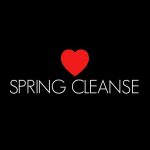Last week the Harvard School of Public Health gave us another big fat reason why avoiding fats is an outdated, bunk (and harmful) theory. I mean I do get the logic behind Dean Ornish-type diets (basically the Pritikin Diet minus the meat). YES, fats should be avoided. But not all fats. And I am not talking a saturated vs. mono vs. poly situation here, or even how much fat should be consumed, I am talking rancid fats vs., well, fats that aren’t rancid. Of course consuming a healthy balance of essential fatty acids is also key (3-6-9), but this ratio should not only be comprised of the perfect combo of fats, but also fats free of rancidity. Are you getting the theme here? Before we just blackball fats, or any food, let’s first take into consideration the one major factor that’s missing, like in these low-fat promoted diets and studies, the QUALITY of the food in question.
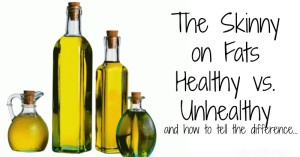
There are SO many people (including kids) suffering from fatty degeneration these days it’s a pandemic. I think Ornish and others in the nutritional community promoting low-fat diets need to instead rethink the quality of fats being consumed instead of just throwing the baby out with the bath water. Again, Ornish has part of this right, yes, fats should be avoided, but only the physiological devastating rancid fats that make-up 99.9% of the commercial oil market. I think these leaders in my industry need to familiarize themselves with some of the super healthy fat-based options that are now available Let’s get these studies that promote low-fat diets to instead use the few available. Let s get these studies that promote low fat diets to instead use the few commercially available oils that aren’t rancid. I mean Rallis Olive Oil is like straight-up medicine! Which leads me into an even deeper issue of quality and why I wrote this blog…
At Harvard’s 2014 Mediterranean Diet & Workplace Health conference they actually ate like Greeks! Well, maybe sort of ate Greek. At least they geared the dishes more toward traditional Greek food like horta (boiled fibrous greens) instead of Americanized gyros, and of course they consumed LOTS of olive oil! It’s exciting that a super traditional academia-based and highly-respected institution such as Harvard is recognizing the importance of eating not only like a Greek, but more of a plant- strong and balanced omega 3-6-9 rich diet!
But is the true traditional Grecian Mediterranean Diet really being replicated at Harvard or elsewhere in the US? Is the way this ancient diet is being fed to you really going to unlock the same health & longevity of the Old World Greeks who live longer, disease-free lives?
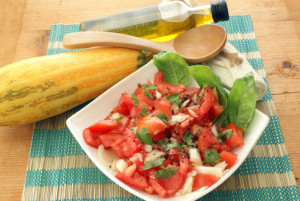
Though I am elated such an iconic and powerful institution like Harvard is recognizing Greece as the leader for preparing healthy Mediterranean cuisine, I feel I can “dish out” a better guide to eating like areal Greek than any Harvard scientist ever could even with all their numbers, data and powerful institutionalized backing. I instead have Greek street cred coupled with double food-cred making me a triple threat! I boast an AS in culinary arts from one of the top institutions in the nation (which, like Harvard, was coined by Newsweek as the “finest in the nation”), am a cutting-edge nutritionist with tons of educational backing and training with years of field experience, and just returned from living in Old World Greece for 4 months! And I’m not listing all this with the intention of bragging (to paraphrase Marianne Williamson from her most famous quote, you gotta own your greatness!), but I am up against Harvard here, so pulling out the creds seems mandatory!
With my strong nutritional background and actually living this Mediterranean lifestyle in Greece, I think what is being lost in translation, like my opening fat theory, is that yes, eating a Grecian Mediterranean Diet results in a longer, better life, but only if you instead base your food intake on quality.
We can try to replicate a Med diet in America with our GMO tomatoes, pesticide- laden lemons and cucumbers, or even think we got this simple diet on lock-down because we are eating organically grown veggies. But if your organic produce is grown in mono-cropped soil, this leaves your pesticide-free and more expensive tomato still pretty much nutrientless. Or what about cooking horta in our fluoride and antibiotic contaminated water, instead of the spring water that most Old World Greeks use, and then topping it all off with rancid olive oil that, well, in America is usually not just processed to rancidity, but may not even be 100% olive oil. In the good ol’ USA we have to worry about blended oil. Which is the (criminal) process where olive oil is combined with other unhealthy rancid heavily processed and GMO’ed oils such as canola, soy and cottonseed oil, etc., to bring corporations profit margins up even higher. I mean plant oil is plant oil, right? What’s the big deal. Well, if you’re buying olive oil, shouldn’t it be freaggin’ olive oil? And don’t even get me started on the obvious differences involved in the farming of animals and preparation/consumption of animal products! Sadly, these are just a few of the detrimental differences between Old World Mediterranean eating and America’s version of a Med Diet.
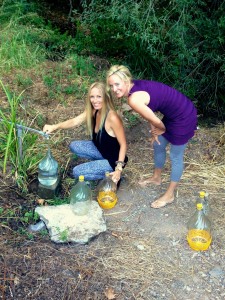
Please tell me how this is the healthier choice?
Also, the elders in the Mediterranean who are living healthy and longer than Americans grow their own food! And what about the fact they live on the sea and are getting iodine and trace mineral almost DAILY! There are SO many more factors involved in this diet leading to healthier, longer lives than just replicating the foods they eat by way of ingredients here in America.
This diet, when eaten like the Old World Greeks, by default creates a superbly balanced diet. Fresh olive oil is slathered on everything (low to no rancidity), butter is unheard of, providing lots omega-9 and a good amount of omega-6 but this is balanced by the omega-3-rich fish plucked right from the sea and is the main meat source (or “was” depending on how modernized the area is). And meat is eaten secondary to all the plants foods consumed, dairy comes from sheep and goats only (zero cow), and is first fermented before eaten raw (zero pasteurization) lending more nutrition and easier digestibility. But beyond minimally consumed animal products, the primary foods that make up this diet are hoards of greens, legumes, tomatoes, garlic, cucumbers, lemons, figs, pomegranates, wild herbs, honey and homemade “hooch”. These are the main staples of a real Greek diet. Walnuts and almonds are also eaten liberally but fresh from the trees (zero rancidity) that somehow manage to find a way to grow between the droves of olive trees.
And the red wine we hear so much about being an integral part of this healthy diet…well, it’s the people of this
region who are drinking their homemade hooch free from chemicals and added sulfites who are living better and longer lives. Not the ones who have moved away from backyard and village- made table wine and instead drink the now commercialized wine made in the region. You with me?
Just cause it came from this region does not mean it’s healthy.
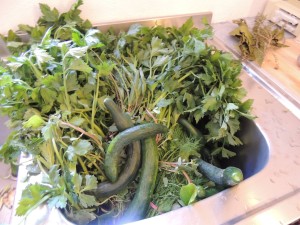
Greek veggies grown in fauna-rich soil old world-style. Doesn’t look like your average grocery store produce does it? Do you recognize the celery? It’s actually a leafy green veggie. Not the clear, leaf-less translucent stalks we have come to know as celery here in the US.
Most importantly, I came to realize the most important factor why this diet is the key to healthy longevity is their quality of life. In the villages, they have community, don’t watch reality TV or even own TV’s, aren’t governed by clock time or killing themselves for material things they don’t need, etc. THEY ARE HAPPY by way of just “being.” Happiness comes from the inside! They are not in search of something better or more. They sit on their porches for hours every day laughing with other villagers, looking at the sea, mountains and NATURE (this is their TV). They are out on their land everyday farming or foraging wild herbs and food. If you go into the big cities like Athens, etc., where they are now living like us, they are all sick like us.
Many of the younger generation are now modernizing traditional Med cuisine. You will find Greek-fusion restaurants popping up all over the place in the larger cities. They are getting sucked into the falsity that modern-gourmet cuisine is healthy. I mean, I thought I was making the healthiest food imaginable when I was in culinary school eons ago. Again, it’s the quality of ingredients that matters and the standards of quality in the culinary world are based on taste and price and this has nothing to do with health. Limitless sugar, rancid oils, bad salts and chemicals are all part of this world. And sure many chef’s are going back to cooking with more local fare, but I sure as heck don’t want your local GMO’s or pesticides. Local food does not magically make an otherwise bad-for-you-ingredient suddenly good-for-you! So sadly, even the newer generation of Greeks are moving away from the very principles that make-up the health and longevity of their ancestor’s diet.
This Harvard Medical conference also unveiled two new phenolic compounds found in olive oil. Which again, takes us back to quality…
It’s important to point out that these newly discovered polyphenols are ONLY found in oils that are produced w/SHORT malaxation time. In laymen terms this is the beginning of the cold-pressing process where they churn the harvested olives in a machine to start the separation of the oil from the flesh of the fruit. And please know, this first step of the olive oil making process is not temperature regulated, though it is the first step in “cold-pressing.” The olives can churn in this machine for as long as the olive pressor wants, creating heat so high you will burn your hand if you touch the side of the machine (I have experienced this). I mean, heat yields more oil. From here, they now “press” the oil within the cold-pressing temperature regulations, but the oil is already rancid. The malaxation process is truly a free-for-all. People need to know this. I can’t say it enough, cold-pressed oil is really a marketing term and has no validity here in the US. And most Greeks who make oil, well, press their own batches for themselves and do not eat the shite that is produced for commercial use here in the U.S.
So, in closing, I agree the Med Diet is truly one of the best diets ever, BUT only if eaten following the quality/purity of a true Old World Mediterranean Diet.
If you enjoyed this blog, please subscribe so you don’t miss out! I will be publishing a series of blogs/vlogs that focuses on all the longevity secrets I found while living in Greece. I will be digging into into the real health practices of the Mediterranean Diet! I even spent time on Ikaria. The Greek Island “where people forget to die.”





